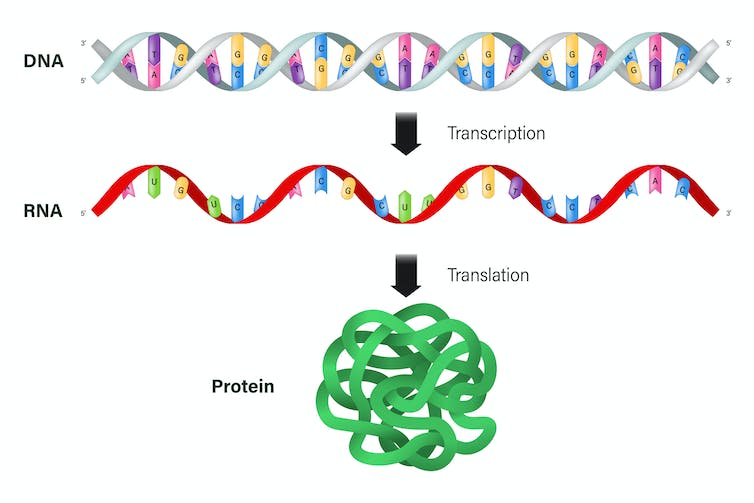While using mRNA as medicine is new, mRNA has been inside you for your entire life. The cells in your body create mRNAs that serve as instructions to make specific proteins you need to function. Researchers can create new mRNAs to correct those instructions when they aren’t working.
I am a molecular biologist who studies how cells control their mRNAs to make the proteins they need, a basic question of how life works at the cellular level. While most scientists studying mRNAs are not creating new drugs, this fundamental understanding of how mRNA works laid the foundation for other scientists to create effective mRNA medicines like COVID-19 vaccines.
By tweaking these instructions, scientists can create powerful new medicines to repair a variety of problems in your cells.
What does mRNA do?
To understand what the mRNAs in your cells are doing for you, let’s start with its more well-known relative, DNA.
DNA is like a set of cookbooks full of different recipes, or genes, to make proteins. People make about 100,000 different proteins that are essential for normal function, such as breaking down nutrients and carrying out other important chemical reactions.
When cells need to make one of those proteins, they don’t read the recipe directly from DNA. Instead, they make a copy in the form of a similar molecule – that’s the mRNA. The “m” stands for messenger, as mRNA contains the message, or recipe, that codes for a protein. About one-third of a cell’s energy is devoted to maintaining the proteins you need, so cells are well equipped to recognize, use and then destroy mRNA once it’s no longer needed.

mRNA is the intermediary between DNA and protein.
Rujirat Boonyong/iStock via Getty Images
The language of mRNA is made of four building blocks called nucleotides, nicknamed A, U, C and G. The recipe to make a protein contains only three-letter words, meaning there are just 64 possible words. Scientists know exactly which words correspond to each protein building block, so they can easily read an mRNA recipe and know what protein will be made. Mutations in the DNA cookbook can alter or delete an mRNA recipe, leading to disease-causing mistakes in critical proteins.
Why do mRNAs make great medicine?
While mRNA has been within us all along, it took decades of research for scientists to understand how cells recognize mRNA and use it to make protein. But it eventually became clear that mRNA could be a powerful medical tool.
Since scientists understand how mRNAs code for proteins, they can easily create recipes for any protein. These recipes can be edited to meet the needs of the patient, whether this means providing a whole new mRNA recipe or tweaking an existing one to make a slight variation of the protein.
Producing mRNA treatments is also scalable because scientists can make large amounts of mRNA in the lab. The method to make one mRNA is the same for all mRNAs, unlike typical drugs…
